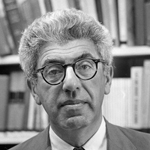Barry Commoner, a biologist at WUSTL from 1947-1981, died Sept. 30, 2012, in Manhattan. He was 95.

Commoner was a professor of plant physiology and of environmental studies, both in Arts & Sciences. According to The New York Times, Commoner was “a founder of modern ecology and one of its most provocative thinkers and mobilizers in making environmentalism a people’s political cause.”
“Dr. Commoner was a leader among a generation of scientist-activists who recognized the toxic consequences of America’s post-World War II technology boom, and one of the first to stir the national debate over the public’s right to comprehend the risks and make decisions about them,” according to the Times obituary.
“Raised in Brooklyn during the Depression and trained as a biologist at Columbia and Harvard, he came armed with a combination of scientific expertise and leftist zeal.”
As a professor at WUSTL for more than three decades, Commoner helped found a survey of baby teeth in St. Louis in the late 1950s. According to the St. Louis Post-Dispatch, “The survey assessed the levels of strontium-90 in the teeth and showed how children were absorbing radioactive fallout from nuclear bombs that were being tested.”
“The survey is credited with helping lead to a partial ban in 1963 of above-ground testing of nuclear weapons,” according to the Post-Dispatch obituary.
“Mr. Commoner aggressively took on the role of educating the public, writing books on environmental issues. Among his works were The Closing Circle and The Poverty of Power. In early 1970, he was on the cover of Time magazine, which referred to him as the Paul Revere of Ecology. He even ran for president as a third-party candidate in 1980.”
For more on Commoner, see The New York Times obituary and the St. Louis Post-Dispatch obituary.